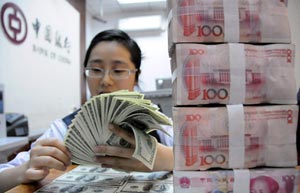China's 'baby boom': cradle of financial reform?
(Xinhua) Updated: 2014-02-28 11:38BEIJING - China's new "baby boom" is not of the demographic variety. New financial systems and products are being born everywhere, bringing trouble to some and great expectations for many.
|
 |
|
|
The financial baby boom started when Jack Ma's online currency fund Yu'e Bao (Leftover Treasure) grew from almost nothing to a global leader, with 50 million investors stumping up 400 billion yuan ($65 billion) in just eight months.
The very simple recipe of a low investment threshold and high yield has catapulted Yu'e Bao and partner Tian Hong Asset Management from obscurity last June, to close to the top of the world today.
The miracle bred many envious copycats who began clawing at the market, scrapping for Internet investors, even going so far as to borrow auspicious characters in their names: "Bao" means both baby and treasure in Chinese.
Niu Wenxin, a highly regarded commentator with the national broadcaster CCTV, went so far as to call Yu'e Bao a "financial parasite" draining "blood" from banks, and the new financial "babies" are now in the sights of many wily old predators.
When Niu described funds like Yu'e Bao as another "central bank" with variable yields and huge capital, his hidebound attempt to nullify the new funds like Yu'e Bao got little support. Doubts and refutation flooded the Internet: What are these funds? Vampires or messiahs?
The creator of Yu'e Bao, Alipay, is angling for floatation on the New York Stock Exchange. The proud parent company posted a long statement online, defending their fat offspring and pouring sarcastic scorn over Niu. Alipay's counterstatement has been reposted and "liked" over 10,000 times.
"Niu knows nothing about finance or innovation," said a "financial analyst" with screen name "Yufenghui".
|
 |
- Banks set to cap rates on Internet funds
- Investment deals for Internet finance up 64%
- Internet finance is in, but is banking out?
- China mulls rules for Internet finance
- Internet finance set for new rules
- Internet finance transforms China's financial landscape
- Internet finance: Golden goose for nest eggs?
- NHTSA says finds no 'defect trend' in Tesla Model S sedans
- WTO rare earth ruling is unfair
- Amway says 2014 China sales may grow 8%
- President Xi in Europe: Forging deals, boosting business
- CNOOC releases 2013 sustainability report
- Local production by Chery Jaguar Land Rover this year
- Car lovers test their need for speed in BMW Mission 3
- China stocks close mixed Monday



















